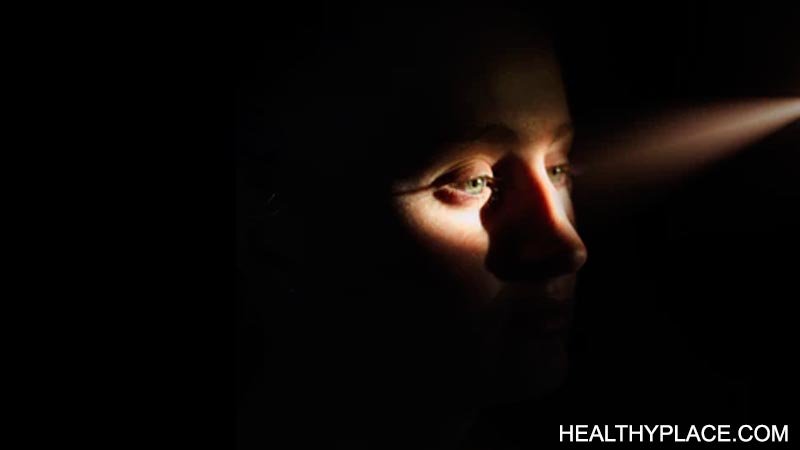Vision Loss from Diabetes and Dealing with Related Anxiety

Vision loss from diabetes is common ("Diabetes Complications: Diabetes and Eye Problems"). Diabetes is a top cause of blindness in the United States; astonishingly, over seven and a half million Americans over the age of 40 have a form of vision problems and loss called diabetic retinopathy (Alvarado, 2017). Let’s examine vision loss from diabetes and the resulting anxiety.
Why Does Vision Loss from Diabetes Happen?
The nature of diabetes explains why eyes are damaged. When we eat, food is digested into glucose, or sugar. This sugar is meant to enter the body’s cells to provide energy; however, in diabetes glucose can’t get into the cells because of a problem with the hormone insulin. Insulin unlocks cells for blood sugar to enter, but in diabetes, either the body can’t produce insulin (type 1 diabetes) or doesn’t use it efficiently (type 2 diabetes). Consequently, sugar remains in the bloodstream and builds to dangerously high levels, a condition known as hyperglycemia.
Chronically high blood sugar damages the small blood vessels that supply the eyes with oxygen and nutrients. People with type 1, type 2, and gestational diabetes (a form of diabetes that develops during pregnancy and disappears after) can suffer eye damage, and almost half (40-45 percent) of those with diabetes have some stage of eye damage or vision loss (National Eye Institute, 2015). Some people are unaware of their developing eye problems. Knowing the symptoms is an important part of minimizing vision loss from diabetes.
Symptoms and Types of Diabetic Vision Loss
Initially, eye disease produces no symptoms. Damage from hypoglycemia is happening, but there are no obvious signs. Gradually, these symptoms appear:
- Blurred vision
- “Floaters” in your field of vision caused by bleeding from abnormal blood vessels
- Distorted vision
- Problems with night vision
- Permanent vision loss
Four primary types of diabetic eye disease cause blindness:
- Diabetic retinopathy (changes to blood vessels in the area of the eye called the retina)
- Diabetic macular edema/DME (swelling in the macula, an area of the retina)
- Cataract (a clouding of the lenses of the eyes, making them opaque)
- Glaucoma (a group of diseases that damages the optic nerve)
While people without diabetes can develop eye disease, these conditions are more common and occur earlier in people with diabetes. Eye damage is a real, and frightening, possibility, and it causes a great deal of anxiety and stress.
Dealing with Anxiety Related to Vision Loss and Diabetes
Diabetes is a difficult disease that impacts the whole person—every system in the body as well as mental health and wellbeing. Health problems, including vision loss, can happen at any time, and the possibility of blindness can be overwhelming. When someone has a diabetes-related eye disease, they often experience significant anxiety: worries, what-ifs, imagined consequences, and fear ("Diabetes and Anxiety: There’s Plenty to Be Anxious About").
Anxiety related specifically to diabetes and vision loss is common. Researchers in Australia discovered that almost 25 percent of people with diabetic retinopathy and diabetic macular edema had anxiety about their eyesight (American Optometric Association, 2016).
Just as diabetes can cause vision loss, so, too, can stress. When stressed, the brain releases the hormone cortisol into the bloodstream. Cortisol damages the body, including the brain, eyes, and vision.
Understandably, people with diabetes often need help dealing with their disease and the accompanying vision loss and anxiety.
Prevention and Treatment of Diabetic Vision Loss, and Anxiety
While sometimes vision loss can’t be completely prevented, it can be slowed or minimized. Early detection of damage is critical; indeed, it can cut the risk of blindness by up to 95 percent (National Eye Institute, 2015). Important actions can help maintain eye health:
- Control blood sugar
- Exercise
- Maintain a healthy diet
- Get regular (at least once yearly) checkups with your ophthalmologist
- Seek timely treatment for any problems discovered
- Follow up with medical care as recommended by your doctor
Treating eye disease to minimize vision loss involves a variety of approaches, such as:
- Laser surgery to shrink abnormal blood vessels or burn leaky ones
- Injections into the eye of corticosteroids or an anti-VEGF treatment (anti-Vascular Endothelial Growth Factor
- Vitrectomy, or the surgical removal of the gel in the center of the eye
Additionally, there are low vision clinics and rehabilitation services available to help as well as vision-improving devices. Vision counselors help, too.
Treating anxiety is also important. When managing anxiety related to diabetic vision loss, certain areas are key. To reduce anxiety, build:
- A sense of control over your life and diabetes
- Acceptance of diabetes and eye disease
- Life goals and action steps to achieve them
- Mindfulness, the art of living in the present rather than in regrets about the past or worries about the future
Vision loss from diabetes is anxiety-provoking. By being proactive and taking measures to treat both diabetic eye disease and related anxiety, you can reclaim control over your physical and mental health.
APA Reference
Peterson, T.
(2022, January 4). Vision Loss from Diabetes and Dealing with Related Anxiety, HealthyPlace. Retrieved
on 2025, December 14 from https://www.healthyplace.com/diabetes/complications/vision-loss-from-diabetes-and-dealing-with-related-anxiety



